Piano Sheet Music
 "Music was my refuge. I could crawl into the space between the notes and curl my back to loneliness." Maya Angelou
"Music was my refuge. I could crawl into the space between the notes and curl my back to loneliness." Maya Angelou
Colbie Caillat

Colbie Marie Caillat (born May 28, 1985 in Newbury Park, California) is an American pop singer-songwriter and guitarist from Malibu, California. Her father, Ken Caillat, co-produced Fleetwood Mac's Rumours and Tusk albums; Caillat recalls being around the likes of Mick Fleetwood and John McVie as a child.
The popularity of Caillat's MySpace profile led her to become the number-one unsigned singer in her genre for four months. Her popularity on the social network was partially due to her song "Bubbly," and the songs on her profile have been played more than forty-two million times (as of May 31, 2008). For the week of July 17, 2007, "Bubbly" was featured on the iTunes Store as the free "Single of the Week". The promotion coincided with the release of Coco, her debut studio album. Caillat was also spotlighted by Rhapsody during the 2007 Black Friday Sale at Best Buy.
According to her MySpace profile, Caillat was first inspired to start singing at age 11 when she first heard the Fugees' 1996 version of the song "Killing Me Softly", made famous by Roberta Flack in 1973. Her MySpace profile also states that, though trained at piano from an early age, Caillat did not begin playing guitar until age nineteen. She also auditioned at least once for the television show American Idol, but never made it to the Hollywood rounds.
In May 2008, Caillat recorded a duet with Jason Mraz, called "Lucky," on his album, We Sing, We Dance, We Steal Things. The same month, Caillat recorded a cover of the song "Kiss the Girl" from The Little Mermaid for Disney's DisneyMania vol. 6 CD.
Caillat is currently shooting another music video in Hawaii for her song "The Little Things."
After touring with The Goo Goo Dolls and Lifehouse in 2007, she is now the supporting act for John Mayer in his 2008 Summer Tour.
The popularity of Caillat's MySpace profile led her to become the number-one unsigned singer in her genre for four months. Her popularity on the social network was partially due to her song "Bubbly," and the songs on her profile have been played more than forty-two million times (as of May 31, 2008). For the week of July 17, 2007, "Bubbly" was featured on the iTunes Store as the free "Single of the Week". The promotion coincided with the release of Coco, her debut studio album. Caillat was also spotlighted by Rhapsody during the 2007 Black Friday Sale at Best Buy.
According to her MySpace profile, Caillat was first inspired to start singing at age 11 when she first heard the Fugees' 1996 version of the song "Killing Me Softly", made famous by Roberta Flack in 1973. Her MySpace profile also states that, though trained at piano from an early age, Caillat did not begin playing guitar until age nineteen. She also auditioned at least once for the television show American Idol, but never made it to the Hollywood rounds.
In May 2008, Caillat recorded a duet with Jason Mraz, called "Lucky," on his album, We Sing, We Dance, We Steal Things. The same month, Caillat recorded a cover of the song "Kiss the Girl" from The Little Mermaid for Disney's DisneyMania vol. 6 CD.
Caillat is currently shooting another music video in Hawaii for her song "The Little Things."
After touring with The Goo Goo Dolls and Lifehouse in 2007, she is now the supporting act for John Mayer in his 2008 Summer Tour.
Mary Poppins
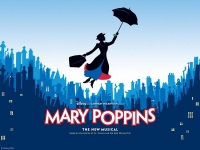
Mary Poppins is an award-winning Disney Theatrical musical based on the similarly-titled series of children's books and the hit Disney 1964 film. The West End production opened in December 2004 and received two Olivier Awards, one for Best Actress in a Musical and the other for Best Theatre Choreography. The musical features the film's music and lyrics by the Academy Award winning Sherman Brothers, along with additional music and lyrics by George Stiles and Anthony Drewe. The book was written by Julian Fellowes. The musical was directed by Richard Eyre and co-directed by Matthew Bourne, who also acted as co-choreographer with Stephen Mear. A Broadway production with a near-identical creative team opened in November 2006, with only minor changes from the West End version.
The stage musical is a fusion of various elements from the film and the books. Some elements from the Mary Poppins series of children's books that had been omitted from the film were restored, such as the walking statue and the ladders rising to the stars. Others were removed, such as the scene in which Uncle Albert gets caught on the ceiling, laughing.
The stage musical is a fusion of various elements from the film and the books. Some elements from the Mary Poppins series of children's books that had been omitted from the film were restored, such as the walking statue and the ladders rising to the stars. Others were removed, such as the scene in which Uncle Albert gets caught on the ceiling, laughing.
Nobuo Uematsu

Nobuo Uematsu (植松伸夫 Uematsu Nobuo?, born March 21, 1959) is a Japanese video game composer and musician, best known for scoring the majority of titles in the Final Fantasy series. He is regarded as one of the most famous and respected composers in the video game community. Uematsu is a self-taught musician; he began to play the piano at the age of eleven or twelve, with Elton John as his biggest influence.
Uematsu joined Square (later Square Enix) in 1985, where he met Final Fantasy creator Hironobu Sakaguchi. They have worked together on numerous titles, most notably the games in the Final Fantasy series. After nearly 20 years in the company, he left Square Enix in 2004 and founded his own company called Smile Please, as well as the music production company Dog Ear Records. He has since composed music as a freelancer for video games primarily developed by Square Enix and Sakaguchi's development studio Mistwalker.
A handful of soundtracks and arranged albums of Uematsu's game scores have been released. Pieces from his video game works have been performed in concerts worldwide, and numerous Final Fantasy concerts have also been held. He has worked with Grammy Award-winning conductor Arnie Roth on several of these concerts. In 2002, he formed a rock band with colleagues Kenichiro Fukui and Tsuyoshi Sekito called The Black Mages, in which Uematsu plays the keyboard. The band plays arranged rock versions of Uematsu's Final Fantasy compositions.
Uematsu joined Square (later Square Enix) in 1985, where he met Final Fantasy creator Hironobu Sakaguchi. They have worked together on numerous titles, most notably the games in the Final Fantasy series. After nearly 20 years in the company, he left Square Enix in 2004 and founded his own company called Smile Please, as well as the music production company Dog Ear Records. He has since composed music as a freelancer for video games primarily developed by Square Enix and Sakaguchi's development studio Mistwalker.
A handful of soundtracks and arranged albums of Uematsu's game scores have been released. Pieces from his video game works have been performed in concerts worldwide, and numerous Final Fantasy concerts have also been held. He has worked with Grammy Award-winning conductor Arnie Roth on several of these concerts. In 2002, he formed a rock band with colleagues Kenichiro Fukui and Tsuyoshi Sekito called The Black Mages, in which Uematsu plays the keyboard. The band plays arranged rock versions of Uematsu's Final Fantasy compositions.
James Horner
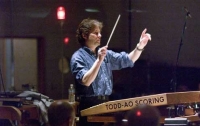
James Roy Horner (born August 14, 1953) is an award winning American composer, orchestrator and conductor of orchestral and film music. He is noted for the integration of choral and electronic elements in many of his film scores, and for frequent use of Celtic musical elements.
In a career that spans over three decades, Horner has composed several of Hollywood's most famous film scores. He is probably best known for his critically acclaimed works on the 1997 film Titanic, which remains today the best selling film soundtrack of all time. Other popular works include Braveheart, Apollo 13, The Mask of Zorro, and The Legend of Zorro.
Horner is a two time Academy Award winner, and has received a total of 11 nominations. He has won numerous other awards, including the Golden Globe Award and the Grammy Award.
In a career that spans over three decades, Horner has composed several of Hollywood's most famous film scores. He is probably best known for his critically acclaimed works on the 1997 film Titanic, which remains today the best selling film soundtrack of all time. Other popular works include Braveheart, Apollo 13, The Mask of Zorro, and The Legend of Zorro.
Horner is a two time Academy Award winner, and has received a total of 11 nominations. He has won numerous other awards, including the Golden Globe Award and the Grammy Award.
Schumann

Robert Schumann, sometimes given as Robert Alexander Schumann, (June 8, 1810 – July 29, 1856) was a German composer, aesthete and influential music critic. He is one of the most famous Romantic composers of the 19th century.
He had hoped to pursue a career as a virtuoso pianist, having been assured by his teacher Friedrich Wieck that he could become the finest pianist in Europe after only a few years of study with him. However, a hand injury prevented those hopes from being realized, and he decided to focus his musical energies on composition. Schumann's published compositions were, until 1840, all for the piano; he later composed works for piano and orchestra, many lieder (songs for voice and piano), four symphonies, an opera, and other orchestral, choral and chamber works. His writings about music appeared mostly in the Neue Zeitschrift für Musik ("The New Journal for Music"), a Leipzig-based publication that he jointly founded.
In 1840, after a long and acrimonious legal battle with his piano instructor Friedrich Wieck, Schumann married Wieck's daughter, pianist Clara Wieck, a considerable figure of the Romantic period in her own right. Clara Wieck showcased many works by her husband as well. For the last two years of his life, after an attempted suicide, Schumann was confined to a mental institution.
He had hoped to pursue a career as a virtuoso pianist, having been assured by his teacher Friedrich Wieck that he could become the finest pianist in Europe after only a few years of study with him. However, a hand injury prevented those hopes from being realized, and he decided to focus his musical energies on composition. Schumann's published compositions were, until 1840, all for the piano; he later composed works for piano and orchestra, many lieder (songs for voice and piano), four symphonies, an opera, and other orchestral, choral and chamber works. His writings about music appeared mostly in the Neue Zeitschrift für Musik ("The New Journal for Music"), a Leipzig-based publication that he jointly founded.
In 1840, after a long and acrimonious legal battle with his piano instructor Friedrich Wieck, Schumann married Wieck's daughter, pianist Clara Wieck, a considerable figure of the Romantic period in her own right. Clara Wieck showcased many works by her husband as well. For the last two years of his life, after an attempted suicide, Schumann was confined to a mental institution.
Offenbach

Jacques Offenbach (20 June 1819 – 5 October 1880) was a Prussian-born French composer, cellist and impresario. He is remembered for his nearly 100 operettas of the 1850s–1870s and his uncompleted opera The Tales of Hoffmann. He was a powerful influence on later composers of the operetta genre, particularly Johann Strauss, Jr. and Arthur Sullivan. His best-known works were continually revived during the 20th century, and many of his operettas continue to be staged in the 21st. The Tales of Hoffman remains part of the standard opera repertory.
William Finn
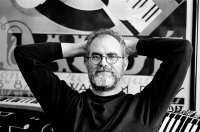
William Alan Finn (born February 28, 1952) is an American composer and lyricist of musicals. His musical Falsettos received the 1992 Tony Awards for Best Music and Lyrics and for Best Book.
Miles Davis

Miles Dewey Davis III (May 26, 1926 – September 28, 1991) was an American trumpeter, bandleader, and composer.
Widely considered one of the most influential musicians of the 20th century, Miles Davis was, with his musical groups, at the forefront of several major developments in jazz music, including bebop, cool jazz, hard bop, modal jazz, and jazz fusion. Many well-known musicians rose to prominence as members of Davis' ensembles, including saxophonists Gerry Mulligan, John Coltrane, Cannonball Adderley, George Coleman, Wayne Shorter, Dave Liebman, Branford Marsalis and Kenny Garrett; trombonist J. J. Johnson; pianists Horace Silver, Red Garland, Wynton Kelly, Bill Evans, Herbie Hancock, Joe Zawinul, Chick Corea, and Keith Jarrett; guitarists John McLaughlin, Pete Cosey, John Scofield and Mike Stern; bassists Paul Chambers, Ron Carter, Dave Holland, Marcus Miller and Darryl Jones ; and drummers Philly Joe Jones, Jimmy Cobb, Tony Williams, Billy Cobham, Jack DeJohnette, and Al Foster.
On October 7, 2008, his album Kind of Blue, released in 1959, received its fourth platinum certification from the RIAA, signifying sales of 4 million copies. Miles Davis was inducted into the Rock and Roll Hall of Fame in 2006. Davis was noted as "one of the key figures in the history of jazz".
On November 5, 2009, Rep. John Conyers of Michigan sponsored a measure in the US House of Representatives to recognize and commemorate the album Kind of Blue on its 50th anniversary. The measure also affirms jazz as a national treasure and "encourages the United States government to preserve and advance the art form of jazz music." It passed, unanimously, with a vote of 409–0 on December 15, 2009.
Widely considered one of the most influential musicians of the 20th century, Miles Davis was, with his musical groups, at the forefront of several major developments in jazz music, including bebop, cool jazz, hard bop, modal jazz, and jazz fusion. Many well-known musicians rose to prominence as members of Davis' ensembles, including saxophonists Gerry Mulligan, John Coltrane, Cannonball Adderley, George Coleman, Wayne Shorter, Dave Liebman, Branford Marsalis and Kenny Garrett; trombonist J. J. Johnson; pianists Horace Silver, Red Garland, Wynton Kelly, Bill Evans, Herbie Hancock, Joe Zawinul, Chick Corea, and Keith Jarrett; guitarists John McLaughlin, Pete Cosey, John Scofield and Mike Stern; bassists Paul Chambers, Ron Carter, Dave Holland, Marcus Miller and Darryl Jones ; and drummers Philly Joe Jones, Jimmy Cobb, Tony Williams, Billy Cobham, Jack DeJohnette, and Al Foster.
On October 7, 2008, his album Kind of Blue, released in 1959, received its fourth platinum certification from the RIAA, signifying sales of 4 million copies. Miles Davis was inducted into the Rock and Roll Hall of Fame in 2006. Davis was noted as "one of the key figures in the history of jazz".
On November 5, 2009, Rep. John Conyers of Michigan sponsored a measure in the US House of Representatives to recognize and commemorate the album Kind of Blue on its 50th anniversary. The measure also affirms jazz as a national treasure and "encourages the United States government to preserve and advance the art form of jazz music." It passed, unanimously, with a vote of 409–0 on December 15, 2009.
Tchaikovsky

Pyotr Il'yich Tchaikovsky (May 7 1840 â November 6 1893) was a Russian composer of the Romantic era. While not part of the nationalistic music group known as "The Five", Tchaikovsky wrote music which, in the opinion of Harold Schonberg, was distinctly Russian: plangent, introspective, with modally-inflected melody and harmony.
Aesthetically, Tchaikovsky remained open to all aspects of Saint Petersburg musical life. He was impressed by Serov and Balakirev as well as the classical values upheld by the conservatory. Both the progressive and conservative camps in Russian music at the time attempted to win him over. Tchaikovsky charted his compositional course between these two factions, retaining his individuality as a composer as well as his Russian identity. In this he was influenced by the ideals of his teacher Nikolai Rubinstein and Nikolai's brother Anton.
Tchaikovsky's musical cosmopolitanism led him to be favored by many Russian music-lovers over the "Russian" harmonies and styles of Mussorgsky, Borodin and Rimsky-Korsakov.
Nonetheless he frequently adapted Russian traditional melodies and dance forms in his music, which enhanced his success in his home country. The success in St. Petersburg at the premiere of his Third Orchestral Suite may have been due in large part to his concluding the work with a polonaise. He also used a polonaise for the final movement of his Third Symphony.
Aesthetically, Tchaikovsky remained open to all aspects of Saint Petersburg musical life. He was impressed by Serov and Balakirev as well as the classical values upheld by the conservatory. Both the progressive and conservative camps in Russian music at the time attempted to win him over. Tchaikovsky charted his compositional course between these two factions, retaining his individuality as a composer as well as his Russian identity. In this he was influenced by the ideals of his teacher Nikolai Rubinstein and Nikolai's brother Anton.
Tchaikovsky's musical cosmopolitanism led him to be favored by many Russian music-lovers over the "Russian" harmonies and styles of Mussorgsky, Borodin and Rimsky-Korsakov.
Nonetheless he frequently adapted Russian traditional melodies and dance forms in his music, which enhanced his success in his home country. The success in St. Petersburg at the premiere of his Third Orchestral Suite may have been due in large part to his concluding the work with a polonaise. He also used a polonaise for the final movement of his Third Symphony.
David Wise

David Wise (born 1967) is an English video game music composer and musician. He was a composer at Rare from 1985 to 2009, and was the company's sole musician up until 1994. He has gained a cult following for his work on various games, particularly Nintendo's Donkey Kong Country series. Wise is known for his atmospheric style of music, mixing natural environmental sounds with prominent melodic and percussive accompaniment.
Prokofiev

Sergei Sergeyevich Prokofiev (Russian: Сергей Сергеевич Прокофьев; Ukrainian: Сергій Сергійович Прокоф'єв) (27 April 1891 – 5 March 1953) was a Russian composer, pianist and conductor who mastered numerous musical genres and came to be admired as one of the greatest composers of the 20th century.
Prokofiev was a soloist with the London Symphony Orchestra, conducted by Piero Coppola, in the first recording of his Piano Concerto No. 3, recorded in London by His Master's Voice in June 1932. Prokofiev also recorded some of his solo piano music for HMV in Paris in February 1935; these recordings were issued on CD by Pearl and Naxos. In 1938, he conducted the Moscow Philharmonic Orchestra in a recording of the second suite from his Romeo and Juliet ballet; this performance was also later released on LP and CD. Another reported recording with Prokofiev and the Moscow Philharmonic was of the First Violin Concerto with David Oistrakh as soloist; Everest Records later released this recording on an LP.
Prokofiev was a soloist with the London Symphony Orchestra, conducted by Piero Coppola, in the first recording of his Piano Concerto No. 3, recorded in London by His Master's Voice in June 1932. Prokofiev also recorded some of his solo piano music for HMV in Paris in February 1935; these recordings were issued on CD by Pearl and Naxos. In 1938, he conducted the Moscow Philharmonic Orchestra in a recording of the second suite from his Romeo and Juliet ballet; this performance was also later released on LP and CD. Another reported recording with Prokofiev and the Moscow Philharmonic was of the First Violin Concerto with David Oistrakh as soloist; Everest Records later released this recording on an LP.
Celine Dion

Céline Marie Claudette Dion (born March 30, 1968 in Charlemagne, Quebec) is a Canadian singer, and occasional songwriter and actress.
Dion had first gained international recognition in the 1980s by winning both the 1982 Yamaha World Popular Song Festival and the 1988 Eurovision Song Contest.
Dion's music has been influenced by genres ranging from rock and R&B to gospel and classical, and while her releases have often received mixed critical reception, she is renowned for her technically skilled and powerful vocals.
Dion had first gained international recognition in the 1980s by winning both the 1982 Yamaha World Popular Song Festival and the 1988 Eurovision Song Contest.
Dion's music has been influenced by genres ranging from rock and R&B to gospel and classical, and while her releases have often received mixed critical reception, she is renowned for her technically skilled and powerful vocals.
Carter Burwell
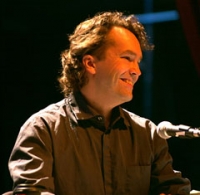
Carter Burwell (born November 18, 1955) is an American composer of film scores.
Burwell was born in New York City. He graduated from King School in Stamford, Connecticut, and Harvard College.
As a film composer, Burwell has had a long working relationship with the Coen Brothers, providing music for every film they have made (except for O Brother, Where Art Thou?, where he simply provided additional music to a score primarily composed by T Bone Burnett). He enjoys working with left-field directors and has also scored Spike Jonze's films. Among his best known film scores are And the Band Played On (1993), Conspiracy Theory (1997), Hamlet (2000), The Spanish Prisoner (1997), Before the Devil Knows You're Dead (2007), In Bruges (2008) and Twilight (2008).
Burwell, like many composers, studied piano. Starting lessons when he was 7, he studied Mozart mostly, but eventually quit.
In April 2005, Burwell composed and conducted music, performed by The Parabola Ensemble, for the plays "Sawbones" written and directed by the Coen Brothers, "Hope Leaves the Theater" written and directed by Charlie Kaufman and "Anomalisa" written and directed by Francis Fregoli. This was a segment of the sound-only production Theater of the New Ear, which debuted at St. Ann's Warehouse in Brooklyn, NY with support from Sirius Satellite Radio, United Talent Agency and Sony Pictures.
Burwell married Christine Sciulli in 1999.
Burwell was born in New York City. He graduated from King School in Stamford, Connecticut, and Harvard College.
As a film composer, Burwell has had a long working relationship with the Coen Brothers, providing music for every film they have made (except for O Brother, Where Art Thou?, where he simply provided additional music to a score primarily composed by T Bone Burnett). He enjoys working with left-field directors and has also scored Spike Jonze's films. Among his best known film scores are And the Band Played On (1993), Conspiracy Theory (1997), Hamlet (2000), The Spanish Prisoner (1997), Before the Devil Knows You're Dead (2007), In Bruges (2008) and Twilight (2008).
Burwell, like many composers, studied piano. Starting lessons when he was 7, he studied Mozart mostly, but eventually quit.
In April 2005, Burwell composed and conducted music, performed by The Parabola Ensemble, for the plays "Sawbones" written and directed by the Coen Brothers, "Hope Leaves the Theater" written and directed by Charlie Kaufman and "Anomalisa" written and directed by Francis Fregoli. This was a segment of the sound-only production Theater of the New Ear, which debuted at St. Ann's Warehouse in Brooklyn, NY with support from Sirius Satellite Radio, United Talent Agency and Sony Pictures.
Burwell married Christine Sciulli in 1999.
Ernesto Lecuona
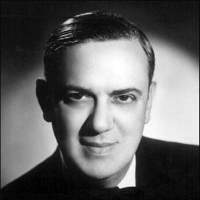
Ernesto Lecuona y Casado (Spanish pronunciation: ; August 6, 1895 – November 29, 1963) was a Cuban composer and pianist of worldwide fame. He composed over six hundred pieces, mostly in the Cuban vein, and was a pianist of exceptional skill. His father was Canarian and his mother was Cuban.
Anne Dudley

Anne Jennifer Dudley (née Beckingham; born 7 May 1956) is a British composer, keyboardist, conductor and pop musician. She was the first BBC Concert Orchestra's Composer in Association in 2001. She has worked in both the classical and pop genres, but she is perhaps best known as one of the core members of the synthpop band Art of Noise and as a film composer. In 1998, Dudley won an Oscar for Best Original Musical or Comedy Score for The Full Monty. In addition to over twenty other film scores, in 2012 she served as music producer for the film version of Les Misérables, also acting as arranger and composing some new additional music.
Bach

Johann Sebastian Bach (31 March 1685 – 28 July 1750) was a German composer and organist whose sacred and secular works for choir, orchestra, and solo instruments drew together the strands of the Baroque period and brought it to its ultimate maturity. Although he introduced no new forms, he enriched the prevailing German style with a robust contrapuntal technique, an unrivalled control of harmonic and motivic organisation in composition for diverse musical forces, and the adaptation of rhythms and textures from abroad, particularly Italy and France.
Revered for their intellectual depth and technical and artistic beauty, Bach's works include the Brandenburg concertos; the Goldberg Variations; the English Suites, French Suites, Partitas, and Well-Tempered Clavier; the Mass in B Minor; the St. Matthew Passion; the St. John Passion; The Musical Offering; The Art of Fugue; the Sonatas and Partitas for violin solo; the Cello Suites; more than 200 surviving cantatas; and a similar number of organ works, including the celebrated Toccata and Fugue in D Minor.
While Bach's fame as an organist was great during his lifetime, he was not particularly well-known as a composer. His adherence to Baroque forms and contrapuntal style was considered "old-fashioned" by his contemporaries, especially late in his career when the musical fashion tended towards Rococo and later Classical styles. A revival of interest and performances of his music began early in the 19th century, and he is now widely considered to be one of the greatest composers in the Western tradition.
Revered for their intellectual depth and technical and artistic beauty, Bach's works include the Brandenburg concertos; the Goldberg Variations; the English Suites, French Suites, Partitas, and Well-Tempered Clavier; the Mass in B Minor; the St. Matthew Passion; the St. John Passion; The Musical Offering; The Art of Fugue; the Sonatas and Partitas for violin solo; the Cello Suites; more than 200 surviving cantatas; and a similar number of organ works, including the celebrated Toccata and Fugue in D Minor.
While Bach's fame as an organist was great during his lifetime, he was not particularly well-known as a composer. His adherence to Baroque forms and contrapuntal style was considered "old-fashioned" by his contemporaries, especially late in his career when the musical fashion tended towards Rococo and later Classical styles. A revival of interest and performances of his music began early in the 19th century, and he is now widely considered to be one of the greatest composers in the Western tradition.
Debussy

Achille-Claude Debussy (August 22, 1862 – March 25, 1918) was a French composer. Along with Maurice Ravel, he is considered one of the most prominent figures working within the field of Impressionist music, though he himself intensely disliked the term when applied to his compositions. Debussy was not only among the most important of all French composers but also was a central figure in all European music at the turn of the twentieth century.
Debussy's music virtually defines the transition from late-Romantic music to twentieth century modernist music. In French literary circles, the style of this period was known as Symbolism, a movement that directly inspired Debussy both as a composer and as an active cultural participant.
Debussy's music virtually defines the transition from late-Romantic music to twentieth century modernist music. In French literary circles, the style of this period was known as Symbolism, a movement that directly inspired Debussy both as a composer and as an active cultural participant.
Frank Sinatra

Francis Albert "Frank" Sinatra (December 12, 1915 â May 14, 1998) was an American singer and actor.
Beginning his musical career in the swing era with Harry James and Tommy Dorsey, Sinatra became a solo artist with great success in the early to mid-1940s, being the idol of the "bobby soxers". His professional career had stalled by the 1950s, but it was reborn in 1954 after he won the Academy Award for Best Supporting Actor.
He signed with Capitol Records and released several critically lauded albums (such as In the Wee Small Hours, Songs for Swingin' Lovers, Come Fly with Me, Only the Lonely and Nice 'n' Easy). Sinatra left Capitol to found his own record label, Reprise Records (finding success with albums such as Ring-A-Ding-Ding, Sinatra at the Sands and Francis Albert Sinatra & Antonio Carlos Jobim), toured internationally, and fraternized with the Rat Pack and President John F. Kennedy in the early 1960s. Sinatra turned 50 in 1965, recorded the retrospective September of My Years, starred in the Emmy-winning television special Frank Sinatra: A Man and His Music, and scored hits with "Strangers in the Night" and "My Way".
Sinatra attempted to weather the changing tastes in popular music, but with dwindling album sales and after appearing in several poorly received films, he retired in 1971. Coming out of retirement in 1973, he recorded several albums, scoring a hit with "(Theme From) New York, New York" in 1980, and toured both within the United States and internationally until a few years before his death in 1998.
Sinatra also forged a career as a dramatic actor, winning the Academy Award for Best Supporting Actor for his performance in From Here to Eternity, and he was nominated for the Academy Award for Best Actor for The Man with the Golden Arm. His also starred in such musicals as High Society, Pal Joey, Guys and Dolls and On the Town. Sinatra was honored with the Kennedy Center Honors in 1983 and awarded the Presidential Medal of Freedom by Ronald Reagan in 1985 and the Congressional Gold Medal in 1997. Sinatra was also the recipient of eleven Grammy Awards, including the Grammy Trustees Award, Grammy Legend Award and the Grammy Lifetime Achievement Award.
Beginning his musical career in the swing era with Harry James and Tommy Dorsey, Sinatra became a solo artist with great success in the early to mid-1940s, being the idol of the "bobby soxers". His professional career had stalled by the 1950s, but it was reborn in 1954 after he won the Academy Award for Best Supporting Actor.
He signed with Capitol Records and released several critically lauded albums (such as In the Wee Small Hours, Songs for Swingin' Lovers, Come Fly with Me, Only the Lonely and Nice 'n' Easy). Sinatra left Capitol to found his own record label, Reprise Records (finding success with albums such as Ring-A-Ding-Ding, Sinatra at the Sands and Francis Albert Sinatra & Antonio Carlos Jobim), toured internationally, and fraternized with the Rat Pack and President John F. Kennedy in the early 1960s. Sinatra turned 50 in 1965, recorded the retrospective September of My Years, starred in the Emmy-winning television special Frank Sinatra: A Man and His Music, and scored hits with "Strangers in the Night" and "My Way".
Sinatra attempted to weather the changing tastes in popular music, but with dwindling album sales and after appearing in several poorly received films, he retired in 1971. Coming out of retirement in 1973, he recorded several albums, scoring a hit with "(Theme From) New York, New York" in 1980, and toured both within the United States and internationally until a few years before his death in 1998.
Sinatra also forged a career as a dramatic actor, winning the Academy Award for Best Supporting Actor for his performance in From Here to Eternity, and he was nominated for the Academy Award for Best Actor for The Man with the Golden Arm. His also starred in such musicals as High Society, Pal Joey, Guys and Dolls and On the Town. Sinatra was honored with the Kennedy Center Honors in 1983 and awarded the Presidential Medal of Freedom by Ronald Reagan in 1985 and the Congressional Gold Medal in 1997. Sinatra was also the recipient of eleven Grammy Awards, including the Grammy Trustees Award, Grammy Legend Award and the Grammy Lifetime Achievement Award.
Klaus Badelt

Klaus Badelt (born 1968) is a German composer, best known for composing film scores.
Badelt was born in Frankfurt, Germany. He started his musical career composing for many successful movies and commercials in his homeland. In 1998, Oscar-winning film composer Hans Zimmer invited Badelt to work at Media Ventures in Santa Monica, his studio co-owned by Jay Rifkin. Since then, Badelt has been working on a number of his own film and television projects such as The Time Machine and K-19: The Widowmaker. He has also collaborated with other Media Ventures composers, such as Harry Gregson-Williams, John Powell, and Zimmer.
While collaborating with Zimmer, Badelt has contributed to the Oscar-nominated scores for The Thin Red Line and The Prince of Egypt, as well as writing music for many well known directors including Ridley Scott, Tony Scott, Terrence Mallick, John Woo, Kathryn Bigelow, Jeffrey Katzenberg, Tom Cruise, Sean Penn, Gore Verbinski, and Steven Spielberg.
Badelt co-produced the score to Hollywood box office hit Gladiator, directed by Ridley Scott, as well as writing portions of the score with singer/composer Lisa Gerrard. Having contributed music to Gladiator, Mission: Impossible 2 and Michael Kamen's score for X-Men, Badelt was involved in the three most successful movies in 2000. Badelt also collaborated with Zimmer on other successful films, such as The Pledge, and 2001 blockbusters Hannibal and Pearl Harbor. One of his more famous - and more popular - scores is the score to the 2003 film Pirates of the Caribbean: The Curse of the Black Pearl.
Among Badelt's most critically celebrated scores are the Chinese fantasy film The Promise and Dreamworks' remake of The Time Machine, the latter which earned him the Discovery of the Year Award at the World Soundtrack Awards 2003.
Badelt was born in Frankfurt, Germany. He started his musical career composing for many successful movies and commercials in his homeland. In 1998, Oscar-winning film composer Hans Zimmer invited Badelt to work at Media Ventures in Santa Monica, his studio co-owned by Jay Rifkin. Since then, Badelt has been working on a number of his own film and television projects such as The Time Machine and K-19: The Widowmaker. He has also collaborated with other Media Ventures composers, such as Harry Gregson-Williams, John Powell, and Zimmer.
While collaborating with Zimmer, Badelt has contributed to the Oscar-nominated scores for The Thin Red Line and The Prince of Egypt, as well as writing music for many well known directors including Ridley Scott, Tony Scott, Terrence Mallick, John Woo, Kathryn Bigelow, Jeffrey Katzenberg, Tom Cruise, Sean Penn, Gore Verbinski, and Steven Spielberg.
Badelt co-produced the score to Hollywood box office hit Gladiator, directed by Ridley Scott, as well as writing portions of the score with singer/composer Lisa Gerrard. Having contributed music to Gladiator, Mission: Impossible 2 and Michael Kamen's score for X-Men, Badelt was involved in the three most successful movies in 2000. Badelt also collaborated with Zimmer on other successful films, such as The Pledge, and 2001 blockbusters Hannibal and Pearl Harbor. One of his more famous - and more popular - scores is the score to the 2003 film Pirates of the Caribbean: The Curse of the Black Pearl.
Among Badelt's most critically celebrated scores are the Chinese fantasy film The Promise and Dreamworks' remake of The Time Machine, the latter which earned him the Discovery of the Year Award at the World Soundtrack Awards 2003.
The Beatles

The Beatles were a pop and rock group from Liverpool, England formed in 1960. Primarily consisting of John Lennon (rhythm guitar, vocals), Paul McCartney (bass guitar, vocals), George Harrison (lead guitar, vocals) and Ringo Starr (drums, vocals) throughout their career, The Beatles are recognised for leading the mid-1960s musical "British Invasion" into the United States. Although their initial musical style was rooted in 1950s rock and roll and homegrown skiffle, the group explored genres ranging from Tin Pan Alley to psychedelic rock. Their clothes, styles, and statements made them trend-setters, while their growing social awareness saw their influence extend into the social and cultural revolutions of the 1960s. After the band broke up in 1970, all four members embarked upon solo careers.
The Beatles are one of the most commercially successful and critically acclaimed bands in the history of popular music, selling over a billion records internationally. In the United Kingdom, The Beatles released more than 40 different singles, albums, and EPs that reached number one, earning more number one albums (15) than any other group in UK chart history. This commercial success was repeated in many other countries; their record company, EMI, estimated that by 1985 they had sold over one billion records worldwide. According to the Recording Industry Association of America, The Beatles have sold more albums in the United States than any other band. In 2004, Rolling Stone magazine ranked The Beatles number one on its list of 100 Greatest Artists of All Time. According to that same magazine, The Beatles' innovative music and cultural impact helped define the 1960s, and their influence on pop culture is still evident today. In 2008, Billboard magazine released a list of top-selling Hot 100 artists to celebrate the chart's fiftieth anniversary; The Beatles reached #1 again.
The Beatles are one of the most commercially successful and critically acclaimed bands in the history of popular music, selling over a billion records internationally. In the United Kingdom, The Beatles released more than 40 different singles, albums, and EPs that reached number one, earning more number one albums (15) than any other group in UK chart history. This commercial success was repeated in many other countries; their record company, EMI, estimated that by 1985 they had sold over one billion records worldwide. According to the Recording Industry Association of America, The Beatles have sold more albums in the United States than any other band. In 2004, Rolling Stone magazine ranked The Beatles number one on its list of 100 Greatest Artists of All Time. According to that same magazine, The Beatles' innovative music and cultural impact helped define the 1960s, and their influence on pop culture is still evident today. In 2008, Billboard magazine released a list of top-selling Hot 100 artists to celebrate the chart's fiftieth anniversary; The Beatles reached #1 again.
Christopher Walker
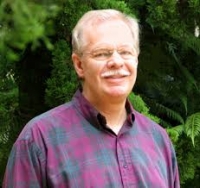
Christopher Walker is an internationally known lecturer, composer and conductor whose works encompass children's music for liturgy and catechetics plus a wealth of material for all liturgical celebrations. His works appear in many of the St. Thomas More Group's American collections.
John Williams

John Towner Williams (born February 8, 1932) is an American composer, conductor, and pianist. In a career that spans six decades, Williams has composed many of the most famous film scores in Hollywood history, including Star Wars, Superman, Home Alone, the first three Harry Potter movies and all but two of Steven Spielberg's feature films including the Indiana Jones series, Schindler's List, E.T. the Extra-Terrestrial, Jurassic Park and Jaws. He also composed the soundtrack for the hit 1960s television series Lost in Space as well as the fanfare of the DreamWorks Pictures' logo.
Williams has composed theme music for four Olympic Games, the NBC Nightly News, the rededication of the Statue of Liberty, and numerous television series and concert pieces. He served as the principal conductor of the Boston Pops Orchestra from 1980 to 1993, and is now the orchestra's laureate conductor.
Williams is a five-time winner of the Academy Award. He has also won four Golden Globe Awards, seven BAFTA Awards and 21 Grammy Awards. With 45 Academy Award nominations, Williams is, together with composer Alfred Newman, the second most nominated person after Walt Disney. He was inducted into the Hollywood Bowl Hall of Fame in 2000, and was a recipient of the Kennedy Center Honors in 2004.
Williams has composed theme music for four Olympic Games, the NBC Nightly News, the rededication of the Statue of Liberty, and numerous television series and concert pieces. He served as the principal conductor of the Boston Pops Orchestra from 1980 to 1993, and is now the orchestra's laureate conductor.
Williams is a five-time winner of the Academy Award. He has also won four Golden Globe Awards, seven BAFTA Awards and 21 Grammy Awards. With 45 Academy Award nominations, Williams is, together with composer Alfred Newman, the second most nominated person after Walt Disney. He was inducted into the Hollywood Bowl Hall of Fame in 2000, and was a recipient of the Kennedy Center Honors in 2004.
Duke Ellington

Edward Kennedy "Duke" Ellington (April 29, 1899 â May 24, 1974) was an American composer, pianist, and bandleader.
Recognized during his life as one of the most influential figures in jazz, if not in all American music, Ellington's reputation has increased since his death, including a special award citation from the Pulitzer Prize Board.
Ellington called his style and sound "American Music" rather than jazz, and liked to describe those who impressed him as "beyond category", including many of the musicians who served with his orchestra, some of whom were themselves considered among the giants of jazz and remained with Ellington's orchestra for decades. While many were noteworthy in their own right, it was Ellington that melded them into one of the most well-known orchestral units in the history of jazz. He often composed specifically for the style and skills of these individuals, such as "Jeep's Blues" for Johnny Hodges, "Concerto for Cootie" ("Do Nothing Till You Hear from Me") for Cootie Williams and "The Mooche" for Tricky Sam Nanton. He also recorded songs written by his bandsmen, such as Juan Tizol's "Caravan" and "Perdido" which brought the "Spanish Tinge" to big-band jazz. After 1941, he frequently collaborated with composer-arranger Billy Strayhorn, who he called his alter-ego.
One of the twentieth century's best-known African-American celebrities, Ellington recorded for many American record companies, and appeared in several films. Ellington and his orchestra toured the United States and Europe regularly before and after World War II. Ellington led his band from 1923 until his death in 1974. His son Mercer Ellington took over the band until his death from cancer in 1996. Paul Ellington, Mercer's youngest son, took over the Orchestra from there and after his mother's passing took over the Estate of Duke and Mercer Ellington.
Recognized during his life as one of the most influential figures in jazz, if not in all American music, Ellington's reputation has increased since his death, including a special award citation from the Pulitzer Prize Board.
Ellington called his style and sound "American Music" rather than jazz, and liked to describe those who impressed him as "beyond category", including many of the musicians who served with his orchestra, some of whom were themselves considered among the giants of jazz and remained with Ellington's orchestra for decades. While many were noteworthy in their own right, it was Ellington that melded them into one of the most well-known orchestral units in the history of jazz. He often composed specifically for the style and skills of these individuals, such as "Jeep's Blues" for Johnny Hodges, "Concerto for Cootie" ("Do Nothing Till You Hear from Me") for Cootie Williams and "The Mooche" for Tricky Sam Nanton. He also recorded songs written by his bandsmen, such as Juan Tizol's "Caravan" and "Perdido" which brought the "Spanish Tinge" to big-band jazz. After 1941, he frequently collaborated with composer-arranger Billy Strayhorn, who he called his alter-ego.
One of the twentieth century's best-known African-American celebrities, Ellington recorded for many American record companies, and appeared in several films. Ellington and his orchestra toured the United States and Europe regularly before and after World War II. Ellington led his band from 1923 until his death in 1974. His son Mercer Ellington took over the band until his death from cancer in 1996. Paul Ellington, Mercer's youngest son, took over the Orchestra from there and after his mother's passing took over the Estate of Duke and Mercer Ellington.
Isaac Albeniz

Isaac Albéniz i Pascual (Spanish pronunciation: ) (May 29, 1860 – May 18, 1909) was a Spanish pianist and composer best known for his piano works based on folk music.
Albéniz’ Suite Española Op.47 is comprised mainly of pieces written in 1886, and grouped together in 1887 in honor of the Queen of Spain. Like many of Albéniz' piano pieces, these works are miniature tone pictures of different geographical regions and musical idioms of Spain. The eight original titles are Granada, Cataluna, Sevilla, Cadiz, Asturias, Aragon, Castilla and Cuba but only the first three titles and Cuba appeared in the original collection. The other pieces were published in later collections, often with different titles. The publisher Hofmeister published all eight titles of Suite Espanola in 1911 after Albéniz’ death, appropriating other pieces for the other four titles so those pieces do not always accurately reflect the geographic designation of the titles, most obviously in the case of Asturias (Leyenda) whose Andalusian flamenco rhythms bear little resemblance to the music of the northern province Asturias. The opus number 47 assigned by Hofmeister has no relation to any chronological order in Albéniz’ oeuvre, in which opus numbers were randomly given by publishers or by Albéniz himself, with some pieces appearing in more than one collection.
Albéniz’ Suite Española Op.47 is comprised mainly of pieces written in 1886, and grouped together in 1887 in honor of the Queen of Spain. Like many of Albéniz' piano pieces, these works are miniature tone pictures of different geographical regions and musical idioms of Spain. The eight original titles are Granada, Cataluna, Sevilla, Cadiz, Asturias, Aragon, Castilla and Cuba but only the first three titles and Cuba appeared in the original collection. The other pieces were published in later collections, often with different titles. The publisher Hofmeister published all eight titles of Suite Espanola in 1911 after Albéniz’ death, appropriating other pieces for the other four titles so those pieces do not always accurately reflect the geographic designation of the titles, most obviously in the case of Asturias (Leyenda) whose Andalusian flamenco rhythms bear little resemblance to the music of the northern province Asturias. The opus number 47 assigned by Hofmeister has no relation to any chronological order in Albéniz’ oeuvre, in which opus numbers were randomly given by publishers or by Albéniz himself, with some pieces appearing in more than one collection.
Dukas
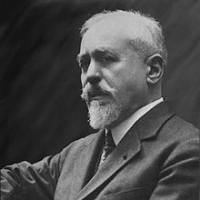
Paul Abraham Dukas (1 October 1865 – 17 May 1935) was a French composer, critic, scholar and teacher. A studious man, of retiring personality, he was intensely self-critical, and he abandoned and destroyed many of his compositions. His best known work is the orchestral piece The Sorcerer's Apprentice (L'apprenti sorcier), the fame of which has eclipsed that of his other surviving works. Among these are an opera Ariane et Barbe-bleue, a symphony, two substantial works for solo piano, and a ballet, La Péri.
At a time when French musicians were divided into conservative and progressive factions, Dukas adhered to neither but retained the admiration of both. His compositions were influenced by composers including Beethoven, Berlioz, Franck, d'Indy and Debussy.
In tandem with his composing career, Dukas worked as a music critic, contributing regular reviews to at least five French journals. Later in his life he was appointed professor of composition at the Conservatoire de Paris and the École Normale de Musique; his pupils included Maurice Duruflé, Olivier Messiaen, Manuel Ponce, and Joaquín Rodrigo.
At a time when French musicians were divided into conservative and progressive factions, Dukas adhered to neither but retained the admiration of both. His compositions were influenced by composers including Beethoven, Berlioz, Franck, d'Indy and Debussy.
In tandem with his composing career, Dukas worked as a music critic, contributing regular reviews to at least five French journals. Later in his life he was appointed professor of composition at the Conservatoire de Paris and the École Normale de Musique; his pupils included Maurice Duruflé, Olivier Messiaen, Manuel Ponce, and Joaquín Rodrigo.
Maury Yeston
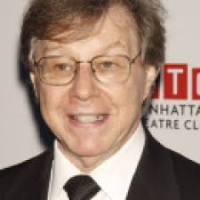
Maury Yeston is an American composer, lyricist, educator and musicologist. He is known for initiating new Broadway musicals, and writing their music and lyrics, among them Nine in 1982, and Titanic in 1997, both of which won him Tony Awards for best musical and best score and each brought him nominations for a Grammy.
OneRepublic

OneRepublic is an American Rock band formed in Colorado. After a few years of moderate success, they have since drawn mainstream attention with the release of their single "Apologize," which has sold in excess of 7 million singles worldwide. The song, according to SoundScan Data, is one of only two songs that have reached 3 million legal downloads in history. A remix of "Apologize" was featured on Timbaland's Shock Value and the band's debut album, Dreaming Out Loud, produced by Greg Wells. Their debut album was released in the United States on November 20, 2007, with international release dates staggered throughout early 2008. As of June 14, 2008, Dreaming Out Loud had sold 761,298 copies in the U.S. with the bands total album sales coming to over 1.5 million worldwide so far. The band's second single, "Stop and Stare," has also crossed the 2 million mark in terms of worldwide single sales. Their third single, "Say (All I Need)", has been released in the UK and in the U.S. Their fourth single will be "Mercy", as stated by OneRepublic's MySpace page. The video has been streamed on Youtube.com.
Current members:
Ryan Tedder – Lead vocals, Guitar, Bass Guitar, Piano, Glockenspiel, Drums (2002–present)
Zach Filkins – Guitar, vocals (2002–present)
Drew Brown – Guitar, Bass Guitar, Glockenspiel (2002–present)
Eddie Fisher – Drums, percussion (2005–present)
Brent Kutzle – Bass guitar, keyboards, cello, vocals (2007–present)
Current members:
Ryan Tedder – Lead vocals, Guitar, Bass Guitar, Piano, Glockenspiel, Drums (2002–present)
Zach Filkins – Guitar, vocals (2002–present)
Drew Brown – Guitar, Bass Guitar, Glockenspiel (2002–present)
Eddie Fisher – Drums, percussion (2005–present)
Brent Kutzle – Bass guitar, keyboards, cello, vocals (2007–present)
Lionel Bart
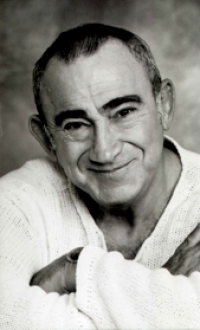
Lionel Bart (1 August 1930 – 3 April 1999) was a writer and composer of British pop music and musicals, best known for creating the book, music and lyrics for Oliver!
He started his songwriting career in amateur theatre, first at The International Youth Centre in 1952 where he and a friend wrote a revue together called IYC Revue 52. The following year the pair auditioned for a production of the Leonard Irwin play The Wages Of Eve at Unity Theatre, London. Shortly after Bart began composing songs for Unity Theatre, contributing material (including the title song) to their 1953 revue Turn It Up, and songs for their 1953 pantomime, an agit prop version of Cinderella. While at Unity he was talent spotted by Joan Littlewood and so joined Theatre Workshop. He also wrote comedy songs for the Sunday lunchtime BBC radio programme The Billy Cotton Band Show.
He first gained widespread recognition through his pop songwriting, penning numerous hits for the stable of young male singers promoted by artist manager and music publisher Larry Parnes. Bart's pop output in this period includes the hits "Living Doll" (written for Cliff Richard) and "Rock with the Cavemen","Handful of Songs", "Butterfingers" and "Little White Bull" (for Tommy Steele). During this period, Mike Pratt as well as Steele were his songwriting partners. In 1957, he won three Ivor Novello Awards, a further four in 1958, and two in 1960. He wrote the theme song for the 1963 James Bond film From Russia with Love. His other hits include: "Do You Mind?" (recorded by both Anthony Newley and Andy Williams), "Big Time" (a 1961 cover of his "Fings Ain't Wot They Used T'Be" show tune by Jack Jones), "Easy Going Me" (Adam Faith) and "Always You And Me" (with Russ Conway).
Bart was also responsible for the discovery of two of Parnes' biggest stars. It was on his recommendation that Parnes went to see singer Tommy Hicks, whom he signed and renamed Tommy Steele, and Bart also suggested that Parnes see singer Reg Smith, who was then performing at the Condor Club. Although Parnes missed his performance, he went round to Smith's house and signed him up on the basis of Bart's recommendation. Smith went on to score a number of UK hits under his new stage name Marty Wilde.
He started his songwriting career in amateur theatre, first at The International Youth Centre in 1952 where he and a friend wrote a revue together called IYC Revue 52. The following year the pair auditioned for a production of the Leonard Irwin play The Wages Of Eve at Unity Theatre, London. Shortly after Bart began composing songs for Unity Theatre, contributing material (including the title song) to their 1953 revue Turn It Up, and songs for their 1953 pantomime, an agit prop version of Cinderella. While at Unity he was talent spotted by Joan Littlewood and so joined Theatre Workshop. He also wrote comedy songs for the Sunday lunchtime BBC radio programme The Billy Cotton Band Show.
He first gained widespread recognition through his pop songwriting, penning numerous hits for the stable of young male singers promoted by artist manager and music publisher Larry Parnes. Bart's pop output in this period includes the hits "Living Doll" (written for Cliff Richard) and "Rock with the Cavemen","Handful of Songs", "Butterfingers" and "Little White Bull" (for Tommy Steele). During this period, Mike Pratt as well as Steele were his songwriting partners. In 1957, he won three Ivor Novello Awards, a further four in 1958, and two in 1960. He wrote the theme song for the 1963 James Bond film From Russia with Love. His other hits include: "Do You Mind?" (recorded by both Anthony Newley and Andy Williams), "Big Time" (a 1961 cover of his "Fings Ain't Wot They Used T'Be" show tune by Jack Jones), "Easy Going Me" (Adam Faith) and "Always You And Me" (with Russ Conway).
Bart was also responsible for the discovery of two of Parnes' biggest stars. It was on his recommendation that Parnes went to see singer Tommy Hicks, whom he signed and renamed Tommy Steele, and Bart also suggested that Parnes see singer Reg Smith, who was then performing at the Condor Club. Although Parnes missed his performance, he went round to Smith's house and signed him up on the basis of Bart's recommendation. Smith went on to score a number of UK hits under his new stage name Marty Wilde.
Josh Groban

Joshua Winslow Groban (born February 27, 1981) is a Grammy-nominated American singer-songwriter. He has concentrated his career so far mostly in concert singing and recordings, although he has stated that he wishes to pursue musical theater in the future.
Various music critics have described Groban's voice in different ways, with some referring to him as a tenor and others as a baritone. In performance, Groban's music goes as low as G2 (as in the song "To Where You Are") and extends up to at least B4 flat or the B flat above middle C (as heard in "You Raise Me Up"). He also hits a High B during the Baywatch theme song in his Emmy performance of TV Theme Songs on September 21, 2008.This places his voice lower than the tenor range on the low end, and just short of Tenor C, and therefore above the baritone range, on the high end.
Some of Groban's musical influences have been Radiohead, Paul Simon, Sting, Peter Gabriel, and Björk. He says he is able to look up to anyone, musically, who has pushed the boundaries and stepped outside of the box. As for vocal influences, "anyone who told a story with their songs," including Mandy Patinkin, Klaus Nomi, George Hearn, and Luciano Pavarotti.
Various music critics have described Groban's voice in different ways, with some referring to him as a tenor and others as a baritone. In performance, Groban's music goes as low as G2 (as in the song "To Where You Are") and extends up to at least B4 flat or the B flat above middle C (as heard in "You Raise Me Up"). He also hits a High B during the Baywatch theme song in his Emmy performance of TV Theme Songs on September 21, 2008.This places his voice lower than the tenor range on the low end, and just short of Tenor C, and therefore above the baritone range, on the high end.
Some of Groban's musical influences have been Radiohead, Paul Simon, Sting, Peter Gabriel, and Björk. He says he is able to look up to anyone, musically, who has pushed the boundaries and stepped outside of the box. As for vocal influences, "anyone who told a story with their songs," including Mandy Patinkin, Klaus Nomi, George Hearn, and Luciano Pavarotti.
Zbigniew Preisner

Zbigniew Preisner (Polish: ; born 20 May 1955 as Zbigniew Antoni Kowalski) is a Polish film score composer, best known for his work with film director Krzysztof KieślowskiZbigniew Preisner was born in Bielsko-Biała, and studied history and philosophy in Kraków. Never having received formal music lessons, he taught himself music by listening and transcribing parts from records. His compositional style represents a distinctively spare form of tonal neo-Romanticism. Paganini and Jean Sibelius are acknowledged influences.
Amy Winehouse

Amy Jade Winehouse (born 14 September 1983) is an English singer-songwriter, known for her eclectic mix of various musical genres including soul, jazz, rock & roll and R&B.
Winehouse's 2003 debut album Frank did well, both commercially and critically, in her native Britain. It was nominated for the Mercury Prize. Her 2006 follow-up album Back to Black led to six Grammy Award nominations and five wins, tying the record for the most wins by a female artist in a single night, and made Winehouse the first British singer to win five Grammys, including three of the "Big Four": Best New Artist, Record of the Year and Song of the Year. On February 14, 2007, she won a BRIT Award for Best British Female Artist; she had also been nominated for Best British Album. She has won the Ivor Novello Award three times, one in 2004 for Best Contemporary Song (musically and lyrically) for "Stronger Than Me", one in 2007 for Best Contemporary Song for "Rehab", and one in 2008 for Best Song Musically and Lyrically for "Love Is a Losing Game", among other prestigious distinctions.
Winehouse has received media attention apart from her singing. Her distinctive style, most notably her signature beehive hairstyle, has spawned imitators and been the muse for fashion designers, as Karl Lagerfeld. The singer's problems with drug and alcohol addiction, as well as self-destructive behaviour, have become regular tabloid news since 2007. She and her husband have been plagued by legal troubles that have led to the cancellation of several tour dates.
In June 2008 it was confirmed that Winehouse has developed early signs of emphysema. Winehouse's father reported in addition she has an irregular heartbeat and said these conditions were brought on by smoking cigarettes and crack cocaine.
Winehouse's 2003 debut album Frank did well, both commercially and critically, in her native Britain. It was nominated for the Mercury Prize. Her 2006 follow-up album Back to Black led to six Grammy Award nominations and five wins, tying the record for the most wins by a female artist in a single night, and made Winehouse the first British singer to win five Grammys, including three of the "Big Four": Best New Artist, Record of the Year and Song of the Year. On February 14, 2007, she won a BRIT Award for Best British Female Artist; she had also been nominated for Best British Album. She has won the Ivor Novello Award three times, one in 2004 for Best Contemporary Song (musically and lyrically) for "Stronger Than Me", one in 2007 for Best Contemporary Song for "Rehab", and one in 2008 for Best Song Musically and Lyrically for "Love Is a Losing Game", among other prestigious distinctions.
Winehouse has received media attention apart from her singing. Her distinctive style, most notably her signature beehive hairstyle, has spawned imitators and been the muse for fashion designers, as Karl Lagerfeld. The singer's problems with drug and alcohol addiction, as well as self-destructive behaviour, have become regular tabloid news since 2007. She and her husband have been plagued by legal troubles that have led to the cancellation of several tour dates.
In June 2008 it was confirmed that Winehouse has developed early signs of emphysema. Winehouse's father reported in addition she has an irregular heartbeat and said these conditions were brought on by smoking cigarettes and crack cocaine.
Pierre Boulez
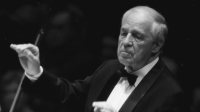
ierre Louis Joseph Boulez CBE was a French composer, conductor, writer and creator of musical institutions. He was one of the dominant figures ..
Richard Marx
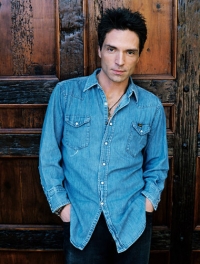
Richard Noel Marx (born September 16, 1963 in Chicago, Illinois) is an adult contemporary and pop/rock singer, songwriter, musician, and record producer. He had a string of highly successful hit singles in the late 1980s and 1990s, including "Endless Summer Nights", "Right Here Waiting", "Now and Forever", and "Hazard". Although most of his major hit songs were slow ballads like these, many of his songs had a classic rock style, such as "Don't Mean Nothing," "Should've Known Better," "Satisfied," and "Too Late To Say Goodbye". Marx placed himself in the record books by being the first solo artist to have his first seven singles hit the Top 5 on the US charts.
Anouk

Anouk Stotijn-Teeuwe (born April 8, 1975) is a Dutch singer. Since 1997 she has released seven pop-rock albums.
Anouk's interest in music began because her mother was a blues singer. Anouk initially sang at weddings and parties with the band Shotgun Wedding, prior to meeting Barry Hay from the Golden Earring, a friend of her ex-husband Edwin Jansen. Hay believed Anouk to have talent, and offered to write some songs for her, one of which was Mood Indigo; written in collaboration with George Kooymans (also from the Golden Earring).
Anouk's interest in music began because her mother was a blues singer. Anouk initially sang at weddings and parties with the band Shotgun Wedding, prior to meeting Barry Hay from the Golden Earring, a friend of her ex-husband Edwin Jansen. Hay believed Anouk to have talent, and offered to write some songs for her, one of which was Mood Indigo; written in collaboration with George Kooymans (also from the Golden Earring).
Lorie Line
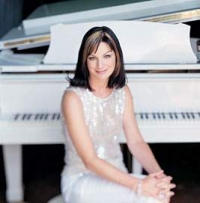
Lorie Line is a pianist and performer from Minneapolis, Minnesota. She has released over 20 albums and tours every year during the Christmas season.
She grew up in Reno, Nevada studying classical piano. At the age of 9, she entered and won annual Statewide competitions until the age of 18, where she enrolled at the University of Nevada, Reno. She received her B.A. in Music, Piano Performance.
Shortly after getting her degree, she and her husband, Tim, relocated to Minneapolis because of his job transfer. Using her piano performance degree, she auditioned for Dayton's and became a full-time pianist, serenading shoppers. It was here (1988-1993) that many fans first came to hear Lorie Line play the piano for the first time. the "shoppers" encouraged Lorie to record her own CD. She did, and became both pianist and vendor at the same time. Little did she know that she was onto something big.
Since then, Lorie Line has turned piano playing into one of the largest independent record companies in the world, Lorie Line Music, Inc. She has sold over 5 million albums, has published over 20 books of music, and has recorded 27 CDs. She, and members of her Pop Chamber Orchestra, performs to 100,000 people on over 85 stages a year. She tours spring, summer, fall and winter.
She grew up in Reno, Nevada studying classical piano. At the age of 9, she entered and won annual Statewide competitions until the age of 18, where she enrolled at the University of Nevada, Reno. She received her B.A. in Music, Piano Performance.
Shortly after getting her degree, she and her husband, Tim, relocated to Minneapolis because of his job transfer. Using her piano performance degree, she auditioned for Dayton's and became a full-time pianist, serenading shoppers. It was here (1988-1993) that many fans first came to hear Lorie Line play the piano for the first time. the "shoppers" encouraged Lorie to record her own CD. She did, and became both pianist and vendor at the same time. Little did she know that she was onto something big.
Since then, Lorie Line has turned piano playing into one of the largest independent record companies in the world, Lorie Line Music, Inc. She has sold over 5 million albums, has published over 20 books of music, and has recorded 27 CDs. She, and members of her Pop Chamber Orchestra, performs to 100,000 people on over 85 stages a year. She tours spring, summer, fall and winter.
Felix Mendelssohn

Jakob Ludwig Felix Mendelssohn Bartholdy, born, and generally known in English-speaking countries, as Felix Mendelssohn (February 3, 1809 – November 4, 1847) was a German composer, pianist, organist and conductor of the early Romantic period.
The grandson of the philosopher Moses Mendelssohn, he was born into a notable Jewish family, although he himself was brought up initially without religion, and later as a Lutheran. He was recognized early as a musical prodigy, but his parents were cautious and did not seek to capitalise on his abilities. Indeed his father was disinclined to allow Felix to follow a musical career until it became clear that he intended to seriously dedicate himself to it.
Early success in Germany was followed by travel throughout Europe; Mendelssohn was particularly well received in England as a composer, conductor and soloist, and his ten visits there, during which many of his major works were premiered, form an important part of his adult career. His essentially conservative musical tastes however set him apart from many of his more adventurous musical contemporaries such as Liszt, Wagner and Berlioz. The Conservatory he founded at Leipzig became a bastion of this anti-radical outlook.
Mendelssohn's work includes symphonies, concerti, oratorios, piano and chamber music. He also had an important role in the revival of interest in the music of Johann Sebastian Bach. After a long period of relative denigration due to changing musical tastes and antisemitism in the late 19th and early 20th centuries, his creative originality is now being recognized and re-evaluated. He is now among the most popular composers of the Romantic era.
The grandson of the philosopher Moses Mendelssohn, he was born into a notable Jewish family, although he himself was brought up initially without religion, and later as a Lutheran. He was recognized early as a musical prodigy, but his parents were cautious and did not seek to capitalise on his abilities. Indeed his father was disinclined to allow Felix to follow a musical career until it became clear that he intended to seriously dedicate himself to it.
Early success in Germany was followed by travel throughout Europe; Mendelssohn was particularly well received in England as a composer, conductor and soloist, and his ten visits there, during which many of his major works were premiered, form an important part of his adult career. His essentially conservative musical tastes however set him apart from many of his more adventurous musical contemporaries such as Liszt, Wagner and Berlioz. The Conservatory he founded at Leipzig became a bastion of this anti-radical outlook.
Mendelssohn's work includes symphonies, concerti, oratorios, piano and chamber music. He also had an important role in the revival of interest in the music of Johann Sebastian Bach. After a long period of relative denigration due to changing musical tastes and antisemitism in the late 19th and early 20th centuries, his creative originality is now being recognized and re-evaluated. He is now among the most popular composers of the Romantic era.
Bobby McFerrin
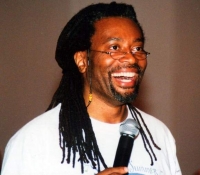
Robert "Bobby" McFerrin Jr. (born in Manhattan, New York, on March 11, 1950) is a jazz-influenced a cappella vocal performer and conductor. He is best known for his 1988 hit song "Don't Worry, Be Happy".
McFerrin is known for his singing technique. Using his unusually large vocal range of four octaves, in many performances he switches rapidly fluidly between normal and falsetto registers to create polyphonic effects, effectively performing both the main melody and the accompanying parts of songs. He makes use of vocal percussion created both with his mouth and by tapping on his chest. McFerrin is also capable of throat singing — a practice common in central Asian regions such as Tuva and Tibet — in which the singer excites the natural overtones from the fundamental vocal pitch, producing a two-or three-part chord of notes from one voice.
A notable document of McFerrin's approach to singing is his 1984 album The Voice, the first solo vocal jazz album recorded with no accompaniment or overdubbing.
McFerrin is known for his singing technique. Using his unusually large vocal range of four octaves, in many performances he switches rapidly fluidly between normal and falsetto registers to create polyphonic effects, effectively performing both the main melody and the accompanying parts of songs. He makes use of vocal percussion created both with his mouth and by tapping on his chest. McFerrin is also capable of throat singing — a practice common in central Asian regions such as Tuva and Tibet — in which the singer excites the natural overtones from the fundamental vocal pitch, producing a two-or three-part chord of notes from one voice.
A notable document of McFerrin's approach to singing is his 1984 album The Voice, the first solo vocal jazz album recorded with no accompaniment or overdubbing.
Enrique Iglesias

Enrique Miguel Iglesias Preysler (born May 8, 1975) is a Spanish-Filipino pop singer-songwriter. His career started in Mexico on Indie label Fonovisa who helped turn him into one of the most popular artists in Latin America and in the Latin market in the United States, selling more Spanish albums than any other artists in that period of time. Before the turn of the millennium he made a crossover into the mainstream English market and signed a unique multi-album deal with Universal Music for an unprecedented $48,000,000, with Universal Music Latino to release his Spanish albums and Interscope to release English albums, Enrique Iglesias has so far sold over 50.000.000 albums worldwide. Iglesias has had two Billboard Hot 100 #1s and one #3, and he holds the record for producing eighteen number #1 Spanish-language singles on the Billboard's Hot Latin Tracks.
Robert Burns
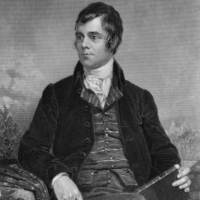
Robert Burns is a Scottish poet. He was a poet and songwriter. He was considered by many to be the national poet of Scotland and was best known for his poetry in the Scottish language. Nevertheless, he wrote many of his works in English and Scottish dialectics, which enabled him to reach a much wider audience.
Stevie Wonder

Stevie Wonder (born Stevland Hardaway Judkins on May 13, 1950, name later changed to Stevland Hardaway Morris) is an American singer-songwriter, multi-instrumentalist, and record producer. A prominent figure in popular music during the latter half of the 20th century , Wonder has recorded more than thirty top ten hits, won 26 Grammy Awards (a record for a solo artist), plus one for lifetime achievement, won an Academy Award for Best Song and been inducted into both the Rock and Roll and Songwriters halls of fame. He has also been awarded the Polar Music Prize.
Blind from infancy, Wonder signed with Motown Records as a pre-adolescent at age twelve, and continues to perform and record for the label to this day. He has nine U.S. number-one hits to his name (on the pop Charts, 20 U.S. R&B number one hits), and album sales totaling more than 150 million units. Wonder has recorded several critically acclaimed albums and hit singles, and writes and produces songs for many of his label mates and outside artists as well. Wonder plays the piano, synthesizer, harmonica, congas, drums, bongos, organ, melodica, and clavinet. In his early career, he was best known for his harmonica work, but today he is better known for his keyboard skills and vocals.
Blind from infancy, Wonder signed with Motown Records as a pre-adolescent at age twelve, and continues to perform and record for the label to this day. He has nine U.S. number-one hits to his name (on the pop Charts, 20 U.S. R&B number one hits), and album sales totaling more than 150 million units. Wonder has recorded several critically acclaimed albums and hit singles, and writes and produces songs for many of his label mates and outside artists as well. Wonder plays the piano, synthesizer, harmonica, congas, drums, bongos, organ, melodica, and clavinet. In his early career, he was best known for his harmonica work, but today he is better known for his keyboard skills and vocals.
Krezip

Krezip is a Dutch band from Tilburg. Active members are singer and pianist Jacqueline Govaert, her sister Anne Govaert on guitar, Annelies Kuijsters playing keyboards, and Joost van Haaren on the bass guitar. In 2004 guitar player Thomas Holthuis was replaced by JanPeter Hoekstra and drummer Thijs Romeijn by Bram van den Berg.
Krezip started as a four-member school band during 1997, in Tilburg, The Netherlands. A year later a new drummer was added. During 1998 Krezip was an act at many festivals throughout the country, such as Festival Mundial, Noorderslag, and Lowlands. Studies and age became a sticking point to accept big offers in the music world. The first official sign of their existence came in 1999, when the band released a demo album on their own label called "Run Around". Big success however didn't materialize until 2000.
The meaning of the name 'Krezip' is rather unclear. Most likely, this name has been chosen as an anagram for 'perzik', the Dutch word for peach, since the band members have continually been eating peaches during their rehearsals.
Jacqueline Govaert has written all of Krezip's songs. She started writing music when she was 12 years old. She states that she can write the best when she doesn't understand anything of the world.
Krezip started as a four-member school band during 1997, in Tilburg, The Netherlands. A year later a new drummer was added. During 1998 Krezip was an act at many festivals throughout the country, such as Festival Mundial, Noorderslag, and Lowlands. Studies and age became a sticking point to accept big offers in the music world. The first official sign of their existence came in 1999, when the band released a demo album on their own label called "Run Around". Big success however didn't materialize until 2000.
The meaning of the name 'Krezip' is rather unclear. Most likely, this name has been chosen as an anagram for 'perzik', the Dutch word for peach, since the band members have continually been eating peaches during their rehearsals.
Jacqueline Govaert has written all of Krezip's songs. She started writing music when she was 12 years old. She states that she can write the best when she doesn't understand anything of the world.
Pink

Alecia Beth Moore (born on September 8, 1979), known professionally as Pink (often stylized as P!nk), is a two-time Grammy-winning American singer-songwriter who gained prominence in 2000.
Pink released her first record, the R&B-oriented Can't Take Me Home, in 2000 via LaFace Records. Her pop rock-based second studio album, M!ssundaztood, was released in 2001 and is her biggest seller to date. Her third album, 2003's Try This, failed to match the success of M!ssundaztood. After taking a break, Pink released her fourth studio album, I'm Not Dead (2006), which was successful worldwide. Pink has so far sold over 25 million albums worldwide. Her upcoming album, Funhouse, will be released in October 2008.
Pink released her first record, the R&B-oriented Can't Take Me Home, in 2000 via LaFace Records. Her pop rock-based second studio album, M!ssundaztood, was released in 2001 and is her biggest seller to date. Her third album, 2003's Try This, failed to match the success of M!ssundaztood. After taking a break, Pink released her fourth studio album, I'm Not Dead (2006), which was successful worldwide. Pink has so far sold over 25 million albums worldwide. Her upcoming album, Funhouse, will be released in October 2008.
Green Day

Green Day is an American rock trio formed in 1987. The band has consisted of Billie Joe Armstrong (vocals, guitar), Mike Dirnt (bass guitar, vocals), and Tré Cool (drums, percussion) for the majority of its existence.
Green Day was originally part of the punk rock scene at 924 Gilman Street in Berkeley, California. Its early releases for independent record label Lookout! Records earned them a grassroots fanbase, some of whom felt alienated when the band signed to a major label.
The band has sold over 65 million records worldwide, They also have three Grammy Awards, Best Alternative Album for Dookie, Best Rock Album for American Idiot, and Record of the Year for "Boulevard of Broken Dreams".
Green Day was originally part of the punk rock scene at 924 Gilman Street in Berkeley, California. Its early releases for independent record label Lookout! Records earned them a grassroots fanbase, some of whom felt alienated when the band signed to a major label.
The band has sold over 65 million records worldwide, They also have three Grammy Awards, Best Alternative Album for Dookie, Best Rock Album for American Idiot, and Record of the Year for "Boulevard of Broken Dreams".
David Foster
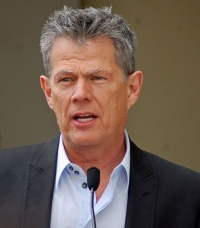
David Walter Foster, OC, OBC (born November 1, 1949), is a Canadian musician, record producer, composer, singer, songwriter and arranger, noted for discovering singers Celine Dion, Josh Groban, and Michael Bublé and for producing some of the most successful artists in the world.
Cat Stevens
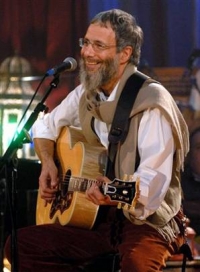
Yusuf Islam, (born Steven Demetre Georgiou on 21 July 1948), best known by his former stage name Cat Stevens, is a British musician of Greek Cypriot and Swedish ancestry. He is a singer-songwriter, multi-instrumentalist, educator, philanthropist and prominent convert to Islam.
As Cat Stevens, he sold over 60 million albums around the world since the late 1960s. His albums Tea for the Tillerman and Teaser and the Firecat were both certified as Triple Platinum by the RIAA in the United States (three million sales each); his album Catch Bull at Four sold half a million copies in the first two weeks of release alone, and was Billboard's number-one LP for three consecutive weeks. His songwriting has also earned him two ASCAP songwriting awards for "The First Cut Is the Deepest," which has been a hit single for five different artists, and has been instrumental for others in establishing their musical careers.
Stevens converted to Islam at the height of his fame in 1977. The following year, he adopted his Muslim name Yusuf Islam, sold all his instruments and awards for charity, and left his music career to devote himself to educational and philanthropic causes in the Muslim community. He turned to his mother to help him decide the best candidate to wed, and thus, in an arranged marriage, took his vows with Fauzia Mubarak Ali, eventually producing five living children from the union.
He has been given several awards for his work in promoting peace in the world, including 2003's World Award, the 2004 Man for Peace award, and the 2007 Mediterranean Prize for Peace. In 2006, he returned to pop music, with his first album of new pop songs in 28 years, entitled An Other Cup.
He lives with his wife, children and grand-child in London. Yusuf Islam spends part of each year in Dubai.
As Cat Stevens, he sold over 60 million albums around the world since the late 1960s. His albums Tea for the Tillerman and Teaser and the Firecat were both certified as Triple Platinum by the RIAA in the United States (three million sales each); his album Catch Bull at Four sold half a million copies in the first two weeks of release alone, and was Billboard's number-one LP for three consecutive weeks. His songwriting has also earned him two ASCAP songwriting awards for "The First Cut Is the Deepest," which has been a hit single for five different artists, and has been instrumental for others in establishing their musical careers.
Stevens converted to Islam at the height of his fame in 1977. The following year, he adopted his Muslim name Yusuf Islam, sold all his instruments and awards for charity, and left his music career to devote himself to educational and philanthropic causes in the Muslim community. He turned to his mother to help him decide the best candidate to wed, and thus, in an arranged marriage, took his vows with Fauzia Mubarak Ali, eventually producing five living children from the union.
He has been given several awards for his work in promoting peace in the world, including 2003's World Award, the 2004 Man for Peace award, and the 2007 Mediterranean Prize for Peace. In 2006, he returned to pop music, with his first album of new pop songs in 28 years, entitled An Other Cup.
He lives with his wife, children and grand-child in London. Yusuf Islam spends part of each year in Dubai.
Alicia Keys

Alicia J. Augello-Cook (born January 25, 1981), and has won numerous awards, including eleven Grammy Awards, seventeen Billboard Music Awards, three American Music Awards.
Her debut album Songs in A Minor was a worldwide success, selling nearly 11 millions albums, and received five Grammy Awards in 2002, with Alicia winning Best New Artist and also Song of the Year for "Fallin'".
Her debut album Songs in A Minor was a worldwide success, selling nearly 11 millions albums, and received five Grammy Awards in 2002, with Alicia winning Best New Artist and also Song of the Year for "Fallin'".
Chopin

Frédéric Chopin (1 March 1810 – 17 October 1849) was a Polish composer and virtuoso pianist of the Romantic period. He is widely regarded as the greatest Polish composer, and ranks as one of music's greatest tone poets.
He was born in the village of Żelazowa Wola, in the Duchy of Warsaw, to a Polish mother and French-expatriate father, and in his early life was regarded as a child-prodigy pianist. In November 1830, at the age of 20, Chopin went abroad; following the suppression of the Polish November Uprising of 1830–31, he became one of many expatriates of the Polish "Great Emigration."
In Paris, he made a comfortable living as a composer and piano teacher, while giving few public performances. A Polish patriot,
Chopin's extant compositions were written primarily for the piano as a solo instrument. Though technically demanding, Chopin's style emphasizes nuance and expressive depth rather than virtuosity. Chopin invented musical forms such as the ballade and was responsible for major innovations in forms such as the piano sonata, waltz, nocturne, étude, impromptu and prelude. His works are mainstays of Romanticism in 19th-century classical music.
He was born in the village of Żelazowa Wola, in the Duchy of Warsaw, to a Polish mother and French-expatriate father, and in his early life was regarded as a child-prodigy pianist. In November 1830, at the age of 20, Chopin went abroad; following the suppression of the Polish November Uprising of 1830–31, he became one of many expatriates of the Polish "Great Emigration."
In Paris, he made a comfortable living as a composer and piano teacher, while giving few public performances. A Polish patriot,
Chopin's extant compositions were written primarily for the piano as a solo instrument. Though technically demanding, Chopin's style emphasizes nuance and expressive depth rather than virtuosity. Chopin invented musical forms such as the ballade and was responsible for major innovations in forms such as the piano sonata, waltz, nocturne, étude, impromptu and prelude. His works are mainstays of Romanticism in 19th-century classical music.
Chris Tomlin and Ed Cash

Christopher Dwayne Tomlin (born May 4, 1972) is a Dove Award winning Christian worship leader and songwriter from Grand Saline, Texas, United States. He is a former staff member at Austin Stone Community Church and is signed to EMI's sixstepsrecords. Tomlin also leads worship at many Passion events. Some of his most well-known songs are "How Great Is Our God," "Jesus Messiah," and "Amazing Grace (My Chains are Gone)."
He was awarded Male Vocalist at the 2006, 2007, and 2008 GMA Dove Awards. He was also named Artist of the Year in 2007 and 2008. Chris Tomlin released his fifth studio album Hello Love on September 2, 2008. Tomlin is one of the members of Compassionart, a charity founded by Martin Smith from Delirious? and Martin's wife Anna.
He was awarded Male Vocalist at the 2006, 2007, and 2008 GMA Dove Awards. He was also named Artist of the Year in 2007 and 2008. Chris Tomlin released his fifth studio album Hello Love on September 2, 2008. Tomlin is one of the members of Compassionart, a charity founded by Martin Smith from Delirious? and Martin's wife Anna.
Casting Crowns
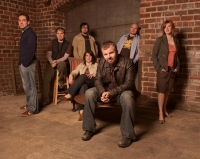
Casting Crowns is a Grammy award and Dove Award winning Christian band that employs a soft rock music style. The band was created in 1999 by youth pastor Mark Hall at First Baptist Church in Downtown Daytona Beach, Florida as part of a Youth Group. He also serves as a lead vocalist. Later they moved to McDonough, Georgia and more members joined creating the band now known as Casting Crowns. Some members of the band currently work as ministers for Eagles Landing First Baptist Church in McDonough, Georgia.
Discovered by, among others, contemporary Christian music legend Steven Curtis Chapman, Casting Crowns received a recording contract and vaulted to popularity in 2003 with their self-titled debut album Casting Crowns. The album quickly made them one of the fastest selling debut artists in Christian music history. Lifesong followed in 2005, debuting at #9 on the Billboard 200 Albums Chart. Both albums have been certified Platinum. The band's third album The Altar and the Door debuted at #2 on the Billboard 200 Albums Chart and #1 on the Hot Christian Albums chart upon its release in August 2007. Ten weeks after it came out it was certified Gold.
Casting Crowns has enjoyed tremendous success in the United States. They have released nine singles to date, seven of which have become consecutive number one hits on various Christian music charts. "Voice of Truth" spent a record-breaking fourteen consecutive weeks at #1 beginning in 2003. "Lifesong" spent nine weeks in the top spot, with "Praise You in This Storm" remaining at #1 for seven weeks. Casting Crowns broke their own record in 2007 when the single "East to West" from The Altar and the Door hit sixteen consecutive weeks at #1. The song ended up enjoying the top spot for a total of nineteen weeks, now their most successful single to date.
Discovered by, among others, contemporary Christian music legend Steven Curtis Chapman, Casting Crowns received a recording contract and vaulted to popularity in 2003 with their self-titled debut album Casting Crowns. The album quickly made them one of the fastest selling debut artists in Christian music history. Lifesong followed in 2005, debuting at #9 on the Billboard 200 Albums Chart. Both albums have been certified Platinum. The band's third album The Altar and the Door debuted at #2 on the Billboard 200 Albums Chart and #1 on the Hot Christian Albums chart upon its release in August 2007. Ten weeks after it came out it was certified Gold.
Casting Crowns has enjoyed tremendous success in the United States. They have released nine singles to date, seven of which have become consecutive number one hits on various Christian music charts. "Voice of Truth" spent a record-breaking fourteen consecutive weeks at #1 beginning in 2003. "Lifesong" spent nine weeks in the top spot, with "Praise You in This Storm" remaining at #1 for seven weeks. Casting Crowns broke their own record in 2007 when the single "East to West" from The Altar and the Door hit sixteen consecutive weeks at #1. The song ended up enjoying the top spot for a total of nineteen weeks, now their most successful single to date.
Tokio Hotel

Tokio Hotel is a German band founded in Magdeburg, Germany in 2001 by singer Bill Kaulitz, guitarist Tom Kaulitz, drummer Gustav Schäfer and bassist Georg Listing. The quartet have scored four number one singles and have released three number one albums in their native country, selling nearly 5 million CDs and DVDs there. After recording an unreleased demo-CD under the name "Devilish" and having their contract with Sony BMG Germany terminated, the band released their first German-language album, Schrei, as Tokio Hotel on Universal Music Germany in 2005. Schrei sold more than half a million copies worldwide and spawned four top five singles in both Germany and Austria. In 2007, the band released their second German album Zimmer 483 and their first English album Scream which have combined album sales of over one million copies worldwide and helped win the band their first MTV Europe Music Award for Best InterAct. The former, Zimmer 483, spawned three top five singles in Germany while the latter, Scream, spawned two singles that reached the top twenty in new territories such as Portugal, Spain and Italy. In September 2008, they won in the US their first MTV Video Music Award for Best New Artist. In October 2008, they won four awards including Best International Artist and Song of the year at Los Premios MTV Latinoamérica held in Mexico. Tokio Hotel became the first German band ever to win an award at the MTV VMAs and also at the MTV Latin America Awards. They also picked up the Headliner award at the MTV Europe Music Awards 2008 held in Liverpool on 6 November 2008 and the Award for Best Group on 5 November 2009 at the MTV Europe Music Award held in Berlin.
 Sheet Music Giant is a site for those who wants to access popular sheet music easily,
letting them download the sheet music for free for trial purposes.
It's completely free to download and try the listed sheet music, but you have to delete the files after 24 hours of trial.
Don't forget, if you like the piece of music you have just learned playing,
treat the artist with respect, and go buy the original sheet music.
Sheet Music Giant is a site for those who wants to access popular sheet music easily,
letting them download the sheet music for free for trial purposes.
It's completely free to download and try the listed sheet music, but you have to delete the files after 24 hours of trial.
Don't forget, if you like the piece of music you have just learned playing,
treat the artist with respect, and go buy the original sheet music.